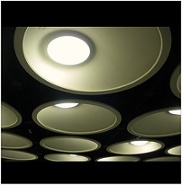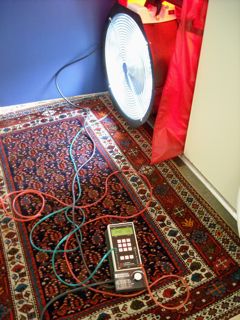Are Freedom and Building Science Incompatible?

 Recently I got a short email from someone that read:
Recently I got a short email from someone that read:
Recently I got a short email from someone that read:
“Just like you to know I’m glad you aren’t in charge. If you stood between me and my freedoms of choice or others you wouldn’t be standing there long.”
Turns out he’d read two of the articles I wrote last week – The McMansion Penalty in ENERGY STAR Version 3 and Kick the Can! – No Recessed Lights in the Building Envelope. Looking at this fellow’s website, I found that he does nice remodeling work, focusing on kitchens and baths.
But why did he feel the need to send me that message? I reread the articles and nowhere did I call for any kind of government intervention to ban can lights or large houses. The McMansion article was about a voluntary program that aims to foster increasing home energy efficiency. The latter was about the problems with can lights from a building science perspective.
Freedom isn’t a black-or-white issue, though, and it doesn’t mean that we’re all free to do whatever we want. We’re not free to walk into someone’s house and help ourselves to their belongings, for example. We’re not free to yell ‘Fire’ in a crowded auditorium. We’re increasingly less free to smoke in buildings. Heck, in many neighborhoods, we’re not even free to use the color of paint we want on our house.
So what exactly is the issue with this reader? Does he send such emails to homeowners’ associations and governing bodies, too? Or are building science, green building programs, and building codes especially incompatible with freedom? Let’s explore that last question further, splitting it into three separate questions.
Is building science incompatible with freedom?
Science is science. Anyone who works on buildings is free to ignore the principles of building science to the extent that they can get away with it, but someone’s going to pay the price. Maybe it’ll be the occupants, who suffer with comfort problems, poor indoor air quality, frequent maintenance, or high energy bills. Maybe it’ll be the remodeler or builder who has to face constant callbacks.
That’s the point I was trying to make with my article on can lights. To the extent that program guidelines or building codes allow can lights, a remodeler or builder can use them. If they’re part of the building envelope, however, and create a problem with the air barrier or insulation, the contractor is giving their client an inferior product. That’s just building science.
Are green building programs incompatible with freedom?
This one’s also a no-brainer. If it’s a voluntary program, how can it interfere with anyone’s freedom? (Well, OK, there’s Henry Gifford and his lawsuit against the USGBC and its LEED program, but I doubt the courts will let it go far.) If anyone has a problem with the new large home penalty in Version 3 of the ENERGY STAR new homes program, they’re perfectly free not to participate. (Although ENERGY STAR is an energy efficiency, not green building, program, I’m lumping them all together here.)
Are building codes incompatible with freedom?
OK, the first two questions were easy, but this is the one, I believe, where the real friction is happening. Building codes contain a lot of prescriptive requirements, mostly to ensure safety and structural stability. Although some contractors may complain about the details or enforcement of some requirements, I think most people understand the need for these measures.
In recent years, though, energy  codes have been gaining a toehold and are even starting to be enforced. For example, we now have a new energy code in Georgia that requires all homes to meet thresholds for infiltration rates and duct leakage. This requires someone to test the house with a Blower Door and duct tester. Is that an example of the state standing between builders and their freedom of choice? Some argue that it is and that builders should be allowed to build leaky, inefficient, energy hog houses if they want to.
codes have been gaining a toehold and are even starting to be enforced. For example, we now have a new energy code in Georgia that requires all homes to meet thresholds for infiltration rates and duct leakage. This requires someone to test the house with a Blower Door and duct tester. Is that an example of the state standing between builders and their freedom of choice? Some argue that it is and that builders should be allowed to build leaky, inefficient, energy hog houses if they want to.
In my opinion, though, we have a serious energy problem, globally and in the US, and energy codes are one way to help us meet the challenges. With the peak of global oil production (peak oil) being upon us, the price of oil is rising. This is leading to the electrification of transportation, which puts pressure on the electric grid and causes prices to rise there, too. Efficient houses are going to be a necessity, whether we like it or not.
If we’re going to live in a civilized society, we always have to consider not only the needs and rights of others around us, but also the bigger picture of what’s happening globally. Am I saying we all need to live in yurts and ride bicycles? No. But we are facing some serious problems that demand a new way of doing things. Freedom demands a certain amount of responsibility, too.
What do you think? Do the demands of building science, green building programs, or building codes infringe on our freedom of choice?
Recessed light photo by UggBoy♥UggGirl from flickr.com.
If this article looks familiar to you, that may be because I originally published it in Daily 5 Remodel.
This Post Has 7 Comments
Comments are closed.

As John Adams said, facts are
As John Adams said, facts are stubborn things. We ignore building science at our own peril. Excellent article!
Sounds like your corespondent
Sounds like your corespondent is arguing for the right to be ignorant and the right to threaten others simply for being correct. This person has no understanding about freedom of choice in a civilization. Sad!
John: Yes,
John: Yes, they are. Facts don’t care whether we ignore them or not.
Doc: You’re right. It is sad. There’s definitely a legitimate debate we can have about how much is too much when it comes to codes, but the person who sent me the email doesn’t want to have that debate.
Dan: You’ve hit the nail on the head. Freedom doesn’t come without responsibility, and we can’t just think about what we want because our actions here and now have effects on others elsewhere and in the future.
I’m impressed. In
I’m impressed. In the face of an “ad hominem” attack you had the courtesy to acknowledge your attacker as doing “nice remodeling work”.Further, you answered his argument with reasoned comment lacking all invective. This shows dignity and a deep understanding of the scientific method. Bravo!
Mike:
Mike: Thanks. I’m not a fan of the cable news style of debate, where ad hominem attacks (and red herrings and straw men and…) are used to advance short-term objectives to the detriment of the long-term good.
Aside from any larger
Aside from any larger environmental issues, people who make the personal freedom argument often speak out of both sides of their mouth. On one hand they argue that people should be able to make decisions without interference from the government based on available information. But then they turn around and shoot the messenger who delivers information that disagrees with their perspective.
When you explain, for example, that Energy Star is voluntary, they usually counter with the argument that [whatever they don’t like] is just the first step in a vast left-wing conspiracy…
Change is hard. People will make every attempt to protect the status quo when think it’s in their interests.
I need a cigarette after
I need a cigarette after reading this.